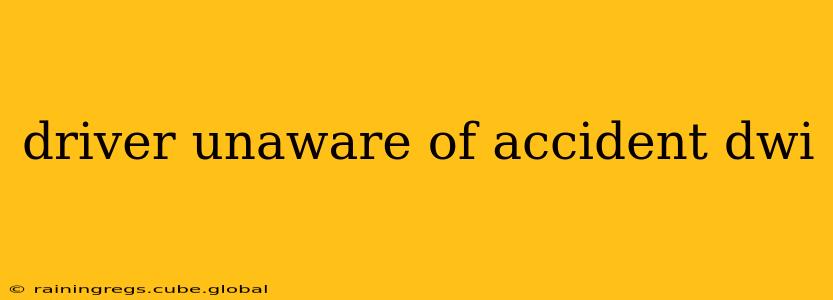A driver's unawareness of an accident following a suspected DUI or DWI (Driving Under the Influence/Driving While Intoxicated) significantly complicates the legal situation. While it might seem like a mitigating factor, it rarely eliminates culpability. This article explores the legal ramifications of such scenarios, clarifying the complexities involved. We'll address frequently asked questions surrounding this issue and delve into the potential consequences.
Can I be Charged with a DWI if I Didn't Know I Hit Something?
Yes, absolutely. The core of a DWI charge lies in operating a vehicle while under the influence of alcohol or drugs, regardless of whether an accident occurred. Even if you were unaware of hitting something, evidence of intoxication (blood alcohol content – BAC, field sobriety tests, witness testimonies) can lead to a DWI charge. The accident itself becomes an additional charge, potentially escalating penalties. Your lack of awareness doesn't negate the dangerous act of driving impaired.
What if There Were No Witnesses to the Accident?
The absence of witnesses doesn't automatically exonerate you. Police can still gather evidence, including:
- Vehicle damage: Scratches, dents, or broken parts on your car can indicate a collision.
- Physical evidence at the scene: Debris, paint transfer, or other remnants from the impact.
- Security camera footage: Surveillance cameras in the area may have captured the incident.
- Your own statements: Anything you say to the police can be used against you, so it’s crucial to remain silent until speaking with an attorney.
Even without direct witness accounts, circumstantial evidence can build a strong case against you.
How Does Hit and Run Factor into a DWI Case?
If you're charged with a DWI and leave the scene of an accident, you'll face additional and more serious charges, including hit and run. Hit and run charges, depending on the jurisdiction and severity of the accident, carry significant penalties, including jail time and hefty fines. Leaving the scene of an accident compounds the initial DWI offense, making the overall legal consequences much more severe.
Can I be Charged with a DWI if I Was Only Slightly Over the Legal Limit?
While the legal BAC limit varies by state, being even slightly above it can still result in a DWI charge. The courts consider any level of impairment dangerous and illegal. There’s no “safe” level of intoxication behind the wheel. Factors beyond BAC, such as erratic driving behavior or other signs of impairment, can also be considered by the police and the court.
What Should I Do if I'm Involved in an Accident While Possibly Impaired?
The best course of action is to remain calm, call emergency services (911), and cooperate with law enforcement officials to the extent legally permitted. Do not admit guilt or offer explanations. Request a lawyer immediately. Your attorney can advise you on your rights and protect your interests throughout the legal proceedings. Anything you say can be used against you.
Seeking Legal Counsel After a DWI Accident
Navigating the legal system after a DWI involving an accident can be daunting. A qualified attorney specializing in DUI/DWI defense can help you understand your rights, build a strong defense strategy, and mitigate potential penalties. Remember, your lack of awareness of the accident itself does not absolve you of responsibility for driving under the influence. Immediate legal representation is crucial to protect your rights and future.
Disclaimer: This information is for educational purposes only and does not constitute legal advice. Consult with a qualified attorney for advice tailored to your specific situation.
